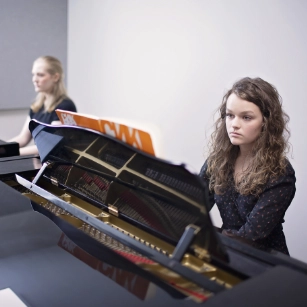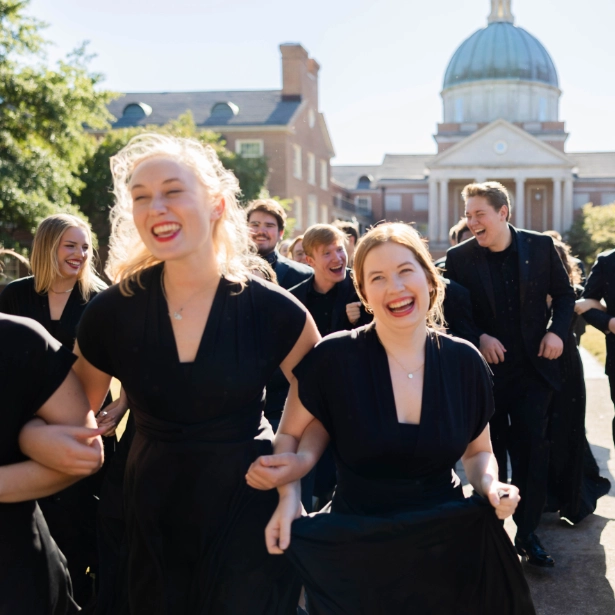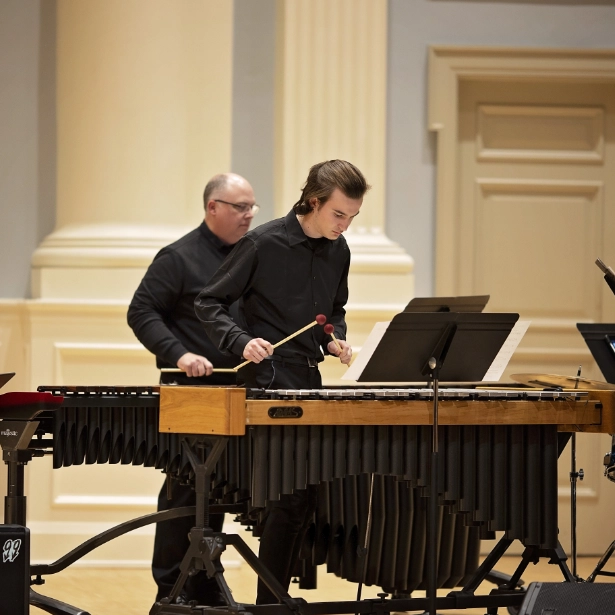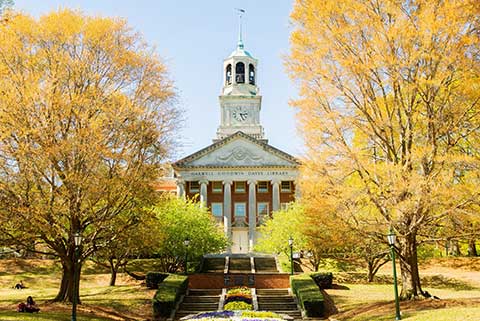
Composition Major – Develop Your Skills as a Composer | Samford University
Major in Composition at Samford University and refine your skills as a composer. Develop expertise in music theory, orchestration, and composition techniques, preparing for a career in music creation, performance, and education.
Bachelor of Music
Composition
Students gain professional experience in composing, arranging, and producing music.

Is This Program for Me?
The Bachelor of Music in Composition is designed for students pursuing a career in music composition or music theory. If you enjoy creating new music and you are fascinated with how music works, then the composition major is for you!
What Will I Learn?
Composition majors are encouraged to explore composition across an array of styles and genres from classical, contemporary and electronic, to jazz, indie rock and worship music.

Student composers have participated in recent master classes and projects with guest ensembles such as Sybarite5, Invoke, and Sandbox Percussion, and learned from composers-in-residence including symphonic, choral, stage, and chamber music composer and thought leader Dr. Robert Sirota, and award-winning game composer Geoff Knorr (Sid Meier’s Civilization VI). Samford composition majors partner with chamber groups and large ensembles for reading/recording sessions, rehearsals, and concert performances. Additionally, students in the composition program have opportunities to gain professional experience in composing, arranging, and producing music for films, podcasts, albums, and music videos. Works by our student composers and recent graduates may be heard at university events (including Samford University’s annual Step Sing program), as well as in film festivals, theatre productions, music recitals, and on all major streaming platforms.
This program offers three concentrations: instrumental, keyboard and voice.

“I actually started off as a voice performance major at Samford, but I had always had a desire to compose. ”
“One thing I love about the composition program at Samford is the one-on-one instruction as well as the encouraging feedback. The professors do a great job of teaching the basic tools while simultaneously fostering the growth of each composer’s individual voice. The music program at Samford has exposed me to a variety of wonderful music as well as taught me how to better create my own.”
—Sarah Giadrosich, junior music composition major
What Makes Us Different?
Composition majors at Samford University build meaningful, powerful connections with their professors, with guest artists, and with their musician peers.

A weekly Music Seminar features our many music majors in performance, regularly giving premieres of student compositions. And each year, the School of the Arts holds a Composition Contest for current students which culminates in a premier of the winning entry during the Samford University Wind Ensemble spring concert. Esteemed guest judges for the contest have included composer James Stephenson, composer Julie Giroux, composer Tyler S. Grant, Dr. Joel Puckett of The Peabody Conservatory, and Dr. Mark Scatterday of the Eastman School of Music. In addition, a newly established Choral Composition Competition allows students to compose for collegiate choral ensembles, with a cash prize and a potential premier performance opportunity by one of Samford’s major ensembles.
Composition majors see success while at Samford and beyond. In recent years, Samford composition graduates have had performances by the Briarwood Orchestra (Briarwood Presbyterian Church, PCA, Birmingham), Sybarite5, Amernet String Quartet, Sotto Voce Quartet, as well as the Alabama and Atlanta Symphony Orchestras. Additionally, their works have been presented in such venues as Weill Recital Hall at Carnegie Hall, the Alys Stephens Center at the University of Alabama at Birmingham, and the Koussevitzky Music Shed at the Tanglewood Music Center. They have earned professional credits in film and video game music and earned graduate degrees from Longy School of Music of Bard College, University of Wisconsin, Texas Christian University, and Cincinnati College-Conservatory of Music.
Career Preparation
Composition majors go on to advanced academic and creative careers, including the possibility of advanced graduate work in music composition and related fields.
Students with a particular interest in composing for film and media may consider pairing the Bachelor of Music Degree in Composition with the Commercial Music Minor for additional development of music industry skills.
Application Information
Freshman applications for next fall are open.Freshman Early Action applications close November 1st.The freshman first scholarship deadline is December 1st.Transfer applications for the spring semester close Dec. 15.Freshman FAFSA priority and scholarship deadlines are Feb. 15.Decision day is coming! Freshman applications for fall enrollment close May 1st.Transfer applications for fall enrollment close July 1st.Freshman applications for fall enrollment are closed. Applications for next year open August 1st.Transfer applications for fall enrollment are closed. Applications for next year open September 1st.
You may also be interested in:

Take the Next Step
Administration
Connect with Us
Employees
Quick Links
Cookie Preferences | Privacy Policy | Software Plugins
Microsoft Excel®
You will need Microsoft Excel® or compatible software like Open Office to read XLS, XLT, XLSX or XLTX files.
Microsoft Power Point®
You will need Microsoft Power Point® or compatible software like Open Office to read POT, POTX, PPS, PPSX, PPT or PPTX files.
Microsoft Word®
You will need Microsoft Word® or compatible software like Open Office to read DOC, DOT, DOCX or DOTX files.
Adobe Portable Document Format
You will need Adobe Acrobat Reader® or compatible software like SumatraPDF to read PDF files.








